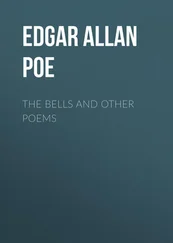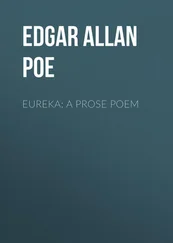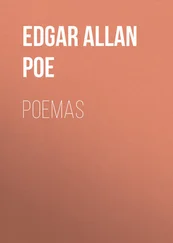The better to deceive the servant in attendance, I did this with the assured air of an old and familiar acquaintance. With a presence of mind truly Parisian, she took the cue at once, and, to greet me, held out the most bewitchingly little of hands. The valet at once fell into the rear; and now, with hearts full to overflowing, we discoursed long and unreservedly of our love.
As Madame Lalande spoke English even less fluently than she wrote it, our conversation was necessarily in French. In this sweet tongue, so adapted to passion, I gave loose to the impetuous enthusiasm of my nature, and, with all the eloquence I could command, besought her to consent to an immediate marriage.
At this impatience she smiled. She urged the old story of decorum—that bug-bear which deters so many from bliss until the opportunity for bliss has forever gone by. I had most imprudently made it known among my friends, she observed, that I desired her acquaintance—thus that I did not possess it—thus, again, there was no possibility of concealing the date of our first knowledge of each other. And then she adverted, with a blush, to the extreme recency of this date. To wed immediately would be improper—would be indecorous—would be outré . All this she said with a charming air of naïveté which enraptured while it grieved and convinced me. She went even so far as to accuse me, laughingly, of rashness—of imprudence. She bade me remember that I really even knew not who she was—what were her prospects, her connections, her standing in society. She begged me, but with a sigh, to reconsider my proposal, and termed my love an infatuation—a will o’ the wisp—a fancy or fantasy of the moment—a baseless and unstable creation rather of the imagination than of the heart. These things she uttered as the shadows of the sweet twilight gathered darkly and more darkly around us—and then, with a gentle pressure of her fairy-like hand, overthrew, in a single sweet instant, all the argumentative fabric she had reared.
I replied as best I could—as only a true lover can. I spoke at length, and perseveringly of my devotion, of my passion—of her exceeding beauty, and of my own enthusiastic admiration. In conclusion, I dwelt, with a convincing energy, upon the perils that encompass the course of love—that course of true love that never did run smooth,—and thus deduced the manifest danger of rendering that course unnecessarily long.
This latter argument seemed finally to soften the rigor of her determination. She relented; but there was yet an obstacle, she said, which she felt assured I had not properly considered. This was a delicate point—for a woman to urge, especially so; in mentioning it, she saw that she must make a sacrifice of her feelings; still, for me, every sacrifice should be made. She alluded to the topic of age. Was I aware—was I fully aware of the discrepancy between us? That the age of the husband, should surpass by a few years—even by fifteen or twenty—the age of the wife, was regarded by the world as admissible, and, indeed, as even proper; but she had always entertained the belief that the years of the wife should never exceed in number those of the husband. A discrepancy of this unnatural kind gave rise, too frequently, alas! to a life of unhappiness. Now she was aware that my own age did not exceed two and twenty; and I, on the contrary, perhaps, was not aware that the years of my Eugénie extended very considerably beyond that sum.
About all this there was a nobility of soul—a dignity of candor—which delighted—which enchanted me—which eternally riveted my chains. I could scarcely restrain the excessive transport which possessed me.
“My sweetest Eugénie,” I cried, “what is all this about which you are discoursing? Your years surpass in some measure my own. But what then? The customs of the world are so many conventional follies. To those who love as ourselves, in what respect differs a year from an hour? I am twenty-two, you say; granted: indeed, you may as well call me, at once, twenty-three. Now you yourself, my dearest Eugénie, can have numbered no more than—can have numbered no more than—no more than—than—than—than—”
Here I paused for an instant, in the expectation that Madame Lalande would interrupt me by supplying her true age. But a Frenchwoman is seldom direct, and has always, by way of answer to an embarrassing query, some little practical reply of her own. In the present instance, Eugénie, who for a few moments past had seemed to be searching for something in her bosom, at length let fall upon the grass a miniature, which I immediately picked up and presented to her.
“Keep it!” she said, with one of her most ravishing smiles. “Keep it for my sake—for the sake of her whom it too flatteringly represents. Besides, upon the back of the trinket you may discover, perhaps, the very information you seem to desire. It is now, to be sure, growing rather dark—but you can examine it at your leisure in the morning. In the meantime, you shall be my escort home to-night. My friends are about holding a little musical levée . I can promise you, too, some good singing. We French are not nearly so punctilious as you Americans, and I shall have no difficulty in smuggling you in, in the character of an old acquaintance.”

With this, she took my arm, and I attended her home. The mansion was quite a fine one, and, I believe, furnished in good taste. Of this latter point, however, I am scarcely qualified to judge; for it was just dark as we arrived; and in American mansions of the better sort lights seldom, during the heat of summer, make their appearance at this, the most pleasant period of the day. In about an hour after my arrival, to be sure, a single shaded solar lamp was lit in the principal drawing-room; and this apartment, I could thus see, was arranged with unusual good taste and even splendor; but two other rooms of the suite, and in which the company chiefly assembled, remained, during the whole evening, in a very agreeable shadow. This is a well-conceived custom, giving the party at least a choice of light or shade, and one which our friends over the water could not do better than immediately adopt.
The evening thus spent was unquestionably the most delicious of my life. Madame Lalande had not overrated the musical abilities of her friends; and the singing I here heard I had never heard excelled in any private circle out of Vienna. The instrumental performers were many and of superior talents. The vocalists were chiefly ladies, and no individual sang less than well. At length, upon a peremptory call for “Madame Lalande,” she arose at once, without affectation or demur, from the chaise longue upon which she had sat by my side, and, accompanied by one or two gentlemen and her female friend of the opera, repaired to the piano in the main drawing-room. I would have escorted her myself, but felt that, under the circumstances of my introduction to the house, I had better remain unobserved where I was. I was thus deprived of the pleasure of seeing, although not of hearing, her sing.
The impression she produced upon the company seemed electrical—but the effect upon myself was something even more. I know not how adequately to describe it. It arose in part, no doubt, from the sentiment of love with which I was imbued; but chiefly from my conviction of the extreme sensibility of the singer. It is beyond the reach of art to endow either air or recitative with more impassioned expression than was hers. Her utterance of the romance in Otello—the tone with which she gave the words “Sul mio sasso,” in the Capuletti—is ringing in my memory yet. Her lower tones were absolutely miraculous. Her voice embraced three complete octaves, extending from the contralto D to the D upper soprano, and, though sufficiently powerful to have filled the San Carlos, executed, with the minutest precision, every difficulty of vocal composition—ascending and descending scales, cadences, or fiorituri . In the finale of the Sonnambula, she brought about a most remarkable effect at the words:
Читать дальше











